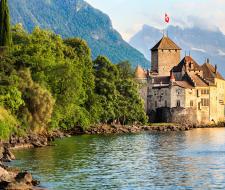12 best universities in Geneva 2026
- Universities in Geneva. Key features for foreign students
- The Higher Education System in Geneva
- Study Programs in Geneva`s Universities
- Enrollment Requirements for Geneva`s Universities
- Universities in Geneva. Cost and Fees for International Students
- Career prospects for graduates
- Top universities in Geneva: Advantages of studying
- Free education in Switzerland — Scholarships and grants
- Student visa
- Employment prospects and opportunities
- Literature and references
This content was developed and approved with active participation of Sam Jones.
In the process of preparing the material, we referenced the following sources:
- https://fr.wikipedia.org/wiki/Universit%C3%A9_de_Gen%C3%A8ve
- https://www.swissinfo.ch/ger/wirtschaft/in-genf-bieten-private-universitaeten-teure-ausbildungen-an--die-nicht-anerkannt-werden/47771116
-
 ranked #=29 in QS International Trade Ranking 2023.
ranked #=29 in QS International Trade Ranking 2023. SwitzerlandGenevaCurrently watching: 2from 5200.00 CHF / term
SwitzerlandGenevaCurrently watching: 2from 5200.00 CHF / term -
 from 1200.00 CHF / 4 lessons
from 1200.00 CHF / 4 lessons
Higher education in Geneva is considered high-quality, reliable and prestigious. The diploma acquired in Switzerland opens the doors for graduates to the largest corporations of different countries, in particular in the field of tourism and hospitality.
Every year Switzerland accepts more than 50 thousand foreign students who want to get a Bachelor's or Master's degree at one of the top universities in Geneva. The Swiss diploma is highly valued at the global labour market.
The international students are attracted by the prestige of Swiss diploma and high level of living, the picturesque nature of the country with its high-altitude Alps, mirror lakes, and clean air. According to the Forbes ranking, Switzerland is recognized as the most environmentally friendly country in the world.
Alternative destinations
Universities in Geneva. Key features for foreign students
Geneva, nestled near the Swiss border, is one of the most densely populated and vibrant cities in Switzerland. Alongside Zurich, Basel, Bern, and Lausanne, Geneva is well known for its luxurious life-style amidst nature, with 20% of the city covered in green areas. As a French-speaking city in the heart of Europe, Geneva boasts a rich social and cultural environment, hosting numerous international corporations and a renowned banking sector. Its role as a global city makes it an attractive destination for students searching for a world-class education, especially in science-oriented fields, as it's home to CERN and the Large Hadron Collider (LHC).
The Higher Education System in Geneva
Geneva's universities are shaped by diverse educational influences, including Anglo-American, French, and German systems. The Swiss education system, interlinked with the country's political structure, comprises 26 cantonal systems guided by common principles and overseen by the Federal Council. Higher education follows the Bologna Agreement's three-stage structure:
- Bachelor's Degree: Typically a 3 to 4-year program, extending to 5 years in Engineering and 7 years in Medicine.
- Master's Degree: A 1 to 2-year program.
- Ph.D.: A 2 to 3-year research degree.
Higher education in Geneva emphasizes both academic and practical components, with a sturdy focus on applied and scientific research. Professional training, provided in various institutes and colleges, is known for its quality, in particular in fields like hotel management, economics, tourism, and finance.

What firstly should be considered when choosing a university?
It depends on the student - everyone determines the most important criteria for himself. I would advise you to take several rankings and compare them with each other, plus take into account the cost of the course, the location of the university and its scale, the percentage of graduates' employment. See where graduates continue their studies or where they go to work.
Study Programs in Geneva`s Universities
Geneva's institutions offer a range of sought-after specializations, including tourism, hospitality, hotel and restaurant management, culinary arts, business, banking, and economics. Competitive programs in medicine, engineering, and legal studies are also available, although enrollment can be challenging due to high demand.
Enrollment Requirements for Geneva`s Universities
Enrolling as an international student requires:
- Being at least 18 years old.
- Completing university preparation, as Swiss secondary education lasts 3 years.
- Submitting a registration form, passport copy, financial proof, secondary education certificate with translation, and language certification (IELTS/TOEFL for English, TCF-DAP/DELF for French, DSH/TestDaF for German, CILS/CELI for Italian).
- Possibly taking entrance exams in Fribourg, covering various subjects.
- For some, presenting an International Baccalaureate (IB) certificate.
Universities in Geneva. Cost and Fees for International Students
- State institutions: The average annual cost is around 1,500 CHF, with additional living expenses of 1,500-2,000 CHF per month.
- Private Institutions: Fees start from 20,000 Euros annually, with specific programs like business and hotel management costing up to 50,000 Euros per year.
Scholarships may be available for students with outstanding academic performance.
Career prospects for graduates
Geneva, a financial hub, offers robust career opportunities in technology, design, financial services, education, art, and more. Large corporations and employers in the city provide internship opportunities, making Geneva an excellent launchpad for ambitious graduates.
In summary, Geneva's universities offer a diverse and prestigious education landscape, making the city an ideal destination for students seeking quality higher education in a dynamic and culturally rich environment.
Top universities in Geneva: Advantages of studying
Tuition Fees
Higher education in Switzerland is often considered incredibly expensive. This is indeed the case for private universities. However, state-supported and cantonal universities offer attractive rates (around $1645 per year), regardless of the student's nationality. Moreover, these institutions are among the most prestigious in the world, particularly in the fields of engineering and natural sciences.
Favorable Geographic Location
The country consists of 26 cantons, or independent provinces with a high degree of autonomy in planning their education systems. Prospective students can choose the language of instruction (English, German, French, or Italian) and the most favorable admission conditions.
Research and Innovation
Swiss institutions not only offer high-quality educational programs but also are leading research centers in Europe. Swiss universities are supported by major international companies, which often recruit students from these institutions. This means that students have access to the latest research opportunities and can find internships of their dreams.
Openness to Foreigners
About 25% of the local population are foreigners. Half of the university faculty members may be foreign specialists. Finally, the country is home to speakers of four languages. Upon arriving in Switzerland, an international student is unlikely to feel like an outsider.
Free education in Switzerland — Scholarships and grants
Switzerland does not offer free education programs, but there are scholarships and grants available to help reduce costs and make life more comfortable. Most of these cover a significant portion of expenses and are accessible to foreigners:
- Government Scholarships: Offered by the Swiss government for the most active and successful students.
- University-Sponsored Grants and Scholarships: Provided by Swiss universities. This financial support is typically awarded to outstanding students.
- Foundation Scholarships: For example, the Alfred Werner Scholarship Fund for master's students.
Student visa
The student must apply for a national D visa to study at the university. All documents must be translated into English, German, French or Italian depending on the canton where the university is located. The visa application must be submitted in person at the Swiss Consulate. Sometimes a test is also organized to check the future student's language skills.
The visa fee must also be paid. The application process takes 8-12 weeks. Visas are usually issued 2-3 weeks before the start of the course; if you need to enter the country earlier, you must state the reason in your application.
You must register with your local immigration office within 14 days of your arrival in Switzerland. You must apply for a temporary residence permit (permesso di soggiorno) at the same immigration office within 90 days.
Employment prospects and opportunities
There is significant competition in Switzerland, especially in the healthcare sector. When hiring foreign candidates, employers primarily have to choose from EU citizens, which limits opportunities for candidates from other countries.
Swiss education is recognized as one of the best in Europe in fields such as engineering, information technology, management, and services. Many EU companies are impressed by Swiss degrees, and students often receive job offers while still studying.
According to statistics, over 90% of graduates from Swiss universities secure employment immediately after graduation. Furthermore, education at local universities is highly practical, allowing students to gain relevant experience during their studies. A prestigious degree and in-demand skills will help you find a job anywhere in the world.
Academic Career: Most professors at Swiss universities are foreigners from around the globe, not just Europe. At ETH, for example, this figure reaches 75%. To find a job, it is essential to be fluent in the national language. Since universities prefer to train successful young researchers, applications from individuals over the age of 35 are likely to be rejected.
Top 14 best universities in Switzerland 2026
| 1 | Glion Institute of Higher Education Switzerland |
| 2 | Les Roches International School Montana |
| 3 | César Ritz Colleges Switzerland |
| 4 | IHTTI School of Hotel Management |
| 5 | Ecole Hoteliere de Lausanne |
| 6 | Geneva Business School |
| 7 | HIM Hotel Institute Montreux |
| 8 | Swiss Hotel Management School |
| 9 | Webster University Geneva |
| 10 | Business and Hotel Management School |
| 11 | Luzern IMI |
| 12 | Swiss Hotel Management School (SHMS) Caux |
| 13 | International University in Geneva |
| 14 | Culinary Arts Academy Switzerland |
Top 10 best universities in Netherlands 2026
Top 35 best universities and colleges in Canada 2026
| 1 | University of Toronto |
| 2 | McGill University |
| 3 | University of British Columbia |
| 4 | University of Alberta |
| 5 | Simon Fraser University |
| 6 | Montreal University |
| 7 | University of Windsor |
| 8 | York University |
| 9 | University of Guelph |
| 10 | McMaster University |
| 11 | University of Manitoba |
| 12 | University of Waterloo |
| 13 | Royal Roads University |
| 14 | Vancouver Film School |
| 15 | Kwantlen Polytechnic University |
| 16 | University of Calgary |
| 17 | Dalhousie University |
| 18 | Fanshawe College |
| 19 | University of Ottawa |
| 20 | Laval University |
| 21 | Sheridan College |
| 22 | University of Regina |
| 23 | Brock University |
| 24 | Thompson Rivers University |
| 25 | Humber College |
| 26 | Vancouver Island University |
| 27 | Mohawk College |
| 28 | Centennial College Toronto |
| 29 | Niagara College |
| 30 | Capilano University |
| 31 | Seneca College |
| 32 | Algoma University |
| 33 | Saint Clair College |
| 34 | Douglas College |
| 35 | LaSalle College |
Literature and references
-
Université de Genève — Wiki
-
In Genf bieten private Universitäten teure Ausbildungen an, die nicht anerkannt werden
-
«Cette 49e place résulte de la qualité de nos équipes»
-
Classement de Shanghai: l'UNIGE entre dans le top 50
-
Classement de Shanghai: les universités suisses progressent
-
Best MBA Universities in Switzerland
